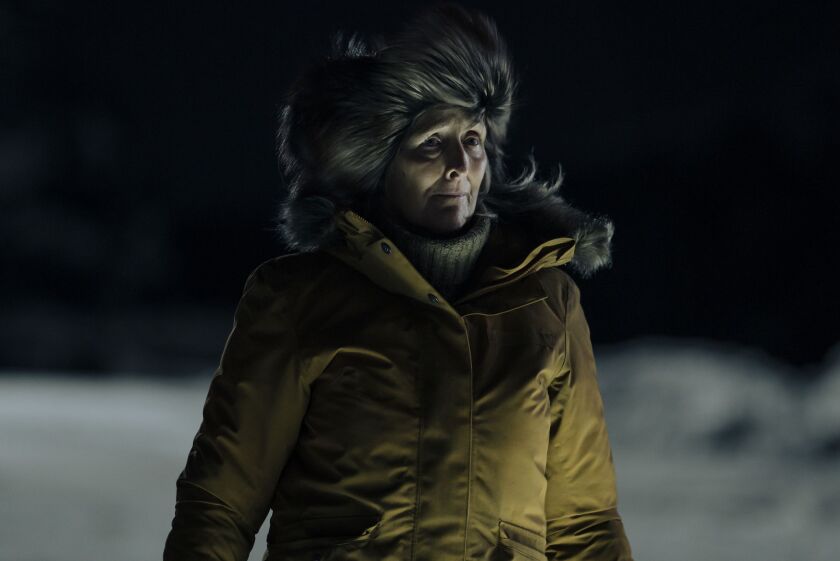More than 30 years after Jodie Foster gave us one of the most memorable law enforcement characters in movie history as FBI trainee Clarice Starling in “The Silence of the Lambs,” Foster remains at the very top of her game playing a cynical and world-weary Alaskan detective who is the polar opposite of Starling in just about every way imaginable on “True Detective: Night Country.”
In the fourth season of Nic Pizzolatto’s anthology crime series, Foster is never less than commanding in her portrayal of Liz Danvers, the police chief of the fictional and remote town of Ennis, Alaska, who has an uncanny ability to puzzle out crimes — and a remarkable propensity for offending and ticking off nearly everyone on her radar.
You know how some people light up a room the moment they enter? Danvers has a way of putting an instant chill into a room when she walks in — and if you told her that, she’d take it as a compliment. This is someone who has the proverbial zero f- - - -s left to give.
With Issa López taking over primary showrunner duties (directing all six episodes and doing most of the writing), “Night Country” is a stand-alone story, though there are some callbacks and homages to certain elements from Season 1. The story is set some 150 miles north of the Arctic Circle. (Filming actually took place in Iceland, and the outdoor visuals are consistently stunning and suitably haunting.)
Save for flashbacks, the story transpires during a time of constant darkness, when day looks just like night, and the residents sometimes have trouble distinguishing between what’s real and what’s in the imagination, and maybe there’s a supernatural world overlapping the two as well.
In a masterfully executed and quite terrifying sequence in the premiere episode, we meet the all-male team of scientists working in the somewhat mysterious TSALAL Arctic Research Station. All seems well — until it doesn’t. Cut to a couple of days later, and the entire team is missing, and the parade scene from “Ferris Bueller’s Day Off” is playing over and over again on the TV, and there’s a … wait, is that a severed tongue on the floor of the lab?
Indeed it is, and this will not be the most grotesquely disturbing discovery we’ll witness. (Superficial parallels to “The Thing” in these early moments are acknowledged by the placement of a DVD copy of the film in the lab.) It’s no great spoiler to say things don’t end well for that team of scientists — but the questions about what happened to them are many and overwhelming and troubling. Was it a tragic accident, fueled by the unforgiving weather and the constant darkness? A mass murder committed by a local? Or could this be the work of dark and unknown forces?
Danvers takes the lead on the case, reluctantly pairing up with detective Evangeline Navarro (the boxer-turned-actor Kali Reis), and to say these two have a history and loathe one another is putting it mildly. Still, they work together and begin to piece together a puzzle that could be tied to a cold case from six years ago.
We learn Danvers has ticked off any number of women in the town by sleeping with their husbands, while Navarro is coping with the loss of her mother due to mental illness, and there’s a strong possibility her troubled sister Julia (Aka Niviána) is going down that same path. Navarro believes it’s possible spirits live on after death and can return during the long nights, while Danvers is having none of that, at one point exclaiming, “Dead people are dead. There’s no heaven. There’s no hell.”
In addition to the primary investigation, with Danvers employing her method of urging colleagues and subordinates to “ask the right questions” to solve the mystery, “Night Country” introduces a sweeping variety of supporting players and subplots, some more compelling than others.
An enigmatic woman named Rose (Fiona Shaw) lives on the edge of town and occasionally sees her dead husband out in the snow. Danvers’ rebellious Iñupiat stepdaughter, Leah (Isabella Star LeBlanc), is getting into trouble and has joined the Indigenous community’s protest against the local mining company that is polluting the waters.
The great John Hawkes plays a veteran cop who is constantly undermining Danvers while he’s getting catfished on the side. A tough but goodhearted local bar owner named Qavvik (Joel D. Montgrand) loves Navarro and only wants to be with her, if only she’ll let him.
At times there’s so much going on that the series almost loses its way — but then there’s another great jump-scare or an intricately staged set piece in the abandoned lab or beneath the ice, and we’re all in. Foster keeps peeling back layers to reveal different sides of Danvers, while relative newcomer Reis proves to be a formidable acting partner.
For all its gruesome scares, “True Detective: Night Country” actually ends on a note of … one might even call it grace.







